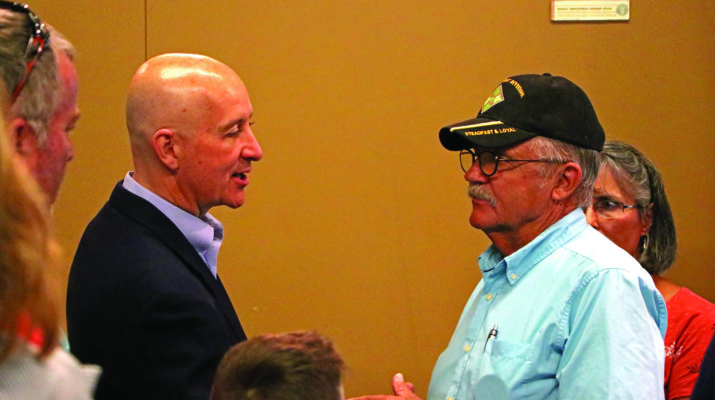Governor Pete Ricketts stopped in Alliance Tuesday morning, conducting a town hall meeting to urge citizens to oppose Executive Order 14008, a plan by President Joe Biden to conserve 30 percent of the lands and waters in the United States by 2030.
The event was kicked off by Sherry Vinton, Vice President of the Nebraska Farm Bureau. She spoke about her experience ranching with her family south of Whitman.
“It’s every generation’s goal to pass that land down in better shape,” said Vinton. “They took care of the land yesterday, we’re taking care of 100 percent of the land today, and we’re going to take care of 100 percent of the land tomorrow. We don’t need a directive to conserve 30 percent of the land by 2030.”
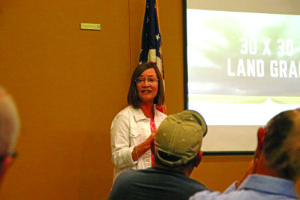
Vinton said the 30X30 plan would increase taxes, and impact farmers, ranchers and small business owners. She encouraged people to support their elected officials as they take a stand against 30X30 plan.
Ricketts described the plan as a land grab. He said the idea spawns from a United Nations convention in 1992, which encouraged nations to set aside 17 percent of their land and waters to preserve in the natural state. He said in 2019, the Center for American Progress published a paper saying 30 percent of land should be set aside for conservation purposes. The current administration, Ricketts noted, adopted that plan with the issuance of Executive Order 14008 in January.
“Right now, if you wanted to get to 30 percent of the United States in conservation, they would have to add on a land mass the size of the state of Nebraska each and every year between now and the next nine years. Another way to think about it is a land mass twice the size of the state of Texas,” said Ricketts.
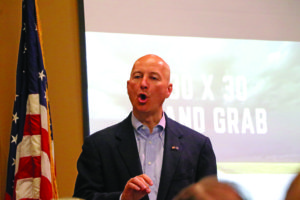
Following the issuance of the order, Ricketts and 14 other governors, from states including South Dakota, Iowa and Montana, sent a letter to President Biden asking for clarification regarding the plan and opposing further land use restrictions in those states. He said there is no Constitutional authority for the President to set aside that much land for conservation.
Ricketts said he has not received a response from the administration. He explained the President issued a document called “America the Beautiful,” which describes the 30X30 plan, including the efforts to conserve the land through voluntary means.
“Of course it has to be voluntary for right now, because they don’t have the authority to do anything else,” Ricketts said.
Under President Donald Trump’s administration, Ricketts explained, power was given to state and local governments the ability to veto land purchases by the federal government. He said that under the new administration, the power was rescinded.
“That doesn’t tell me that you want to work with us as local governments if the first thing you do when you get in office is rescind our ability to stop the federal government from buying land in our state,” said Ricketts. “That doesn’t sound like it’s a very cooperative thing.”
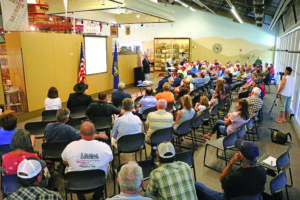
Ricketts said his concern about the plan comes from its lack of clarity.
“While they say it’s voluntary now, if you’re going to try to get additional land, by the way they say right now about 12 percent of the land is protected, permanently protected in a natural state, so they are saying they are at 12 percent and they want to get to 30 percent. To get that, we have to get a size the state of Nebraska each year for the next nine years. How do you do that on a voluntary basis? I don’t see how. This is one of the things that makes me so concerned about this. They’ve set this goal, they say it’s going to be all well, how are they going to do that?” Ricketts asked.
Ricketts explained that if the plan goes into full effect, it would result in an increase in taxes.
“If the federal government is setting aside, for conservation, 30 percent of our state, that means everybody else is going to have to pay more in taxes, because if land is in conservation, it’s restricted,” said Ricketts. “Your county assessor then has to reduce the value of it. Or, if the federal government buys it, it comes off the tax rolls. Now, the federal government does pay taxes in lieu on some of the lands they own. On average, in the state of Nebraska, they’re paying $2.50 an acre in property taxes.”
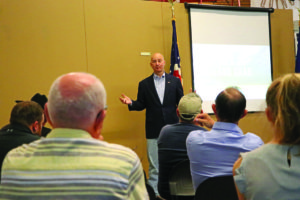
Ricketts advised citizens to carefully consider their actions before entering into permanent conservation easement. He noted that in Nebraska, people, when entering into a conservation easement, can stipulate that the easement would only last for a certain period of time. He noted that citizens should “read the fine print” before signing contracts with the federal government.
He also encouraged citizens to contact their local governments to pass resolutions opposing the 30X30 plan and to work with the county government regarding the ability to review conservation easements. The Box Butte County Commissioners signed a resolution opposing the 30X30 plan on April 7.
Ricketts encouraged people to take is to support their federal representatives in opposing the 30X30 plan. He advised people to research the plan and its origins to stay informed, and to share that information with others.
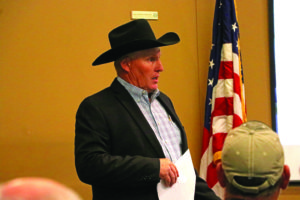
Morrill County Commissioner Jeff Metz also spoke at the town hall, noting that Morrill County was the first county in Nebraska to pass a resolution to oppose the 30X30 plan. He said more counties in Nebraska need to pass resolutions opposing the plan.
Approximately 115 people were in attendance at the town hall, with people traveling from throughout the Panhandle to attend. During a question and answer session, many people voiced their concerns regarding the plan. One person asked about the effectiveness of passing resolutions by local government agencies. Ricketts responded that it is an important tool to raise awareness of the issues and show concern about the plan.
Another person asked about the power structure of the administration and how they are implementing the plan. Ricketts responded that he would take legal action if the Biden administration implemented the plan in a way similar to President Barack Obama’s administration in enacting the Waters of the United States, which was also contested and eventually repealed.
In an interview following the town hall, Ricketts said 12 percent of land in the United States already qualifies under the 30X30 plan, noting that they are seeking an additional 440 million acres. He explained that at other town hall meetings he has hosted, he has had pushback against his efforts due to the voluntary nature of the plan.
“The problem is the Biden administration has not been clear about what they mean,” Ricketts said. “Of course they say voluntary now because they don’t have anything else. I want to see details from the Biden administration as to how they are going to do this. I don’t believe there’s any way to do that in a voluntary way.”
Ricketts said he has heard from many people at the town hall meetings he has conducted so far voice their concerns about the lack of the plan’s clarity.
“People are concerned because we don’t have good information,” said Ricketts.

